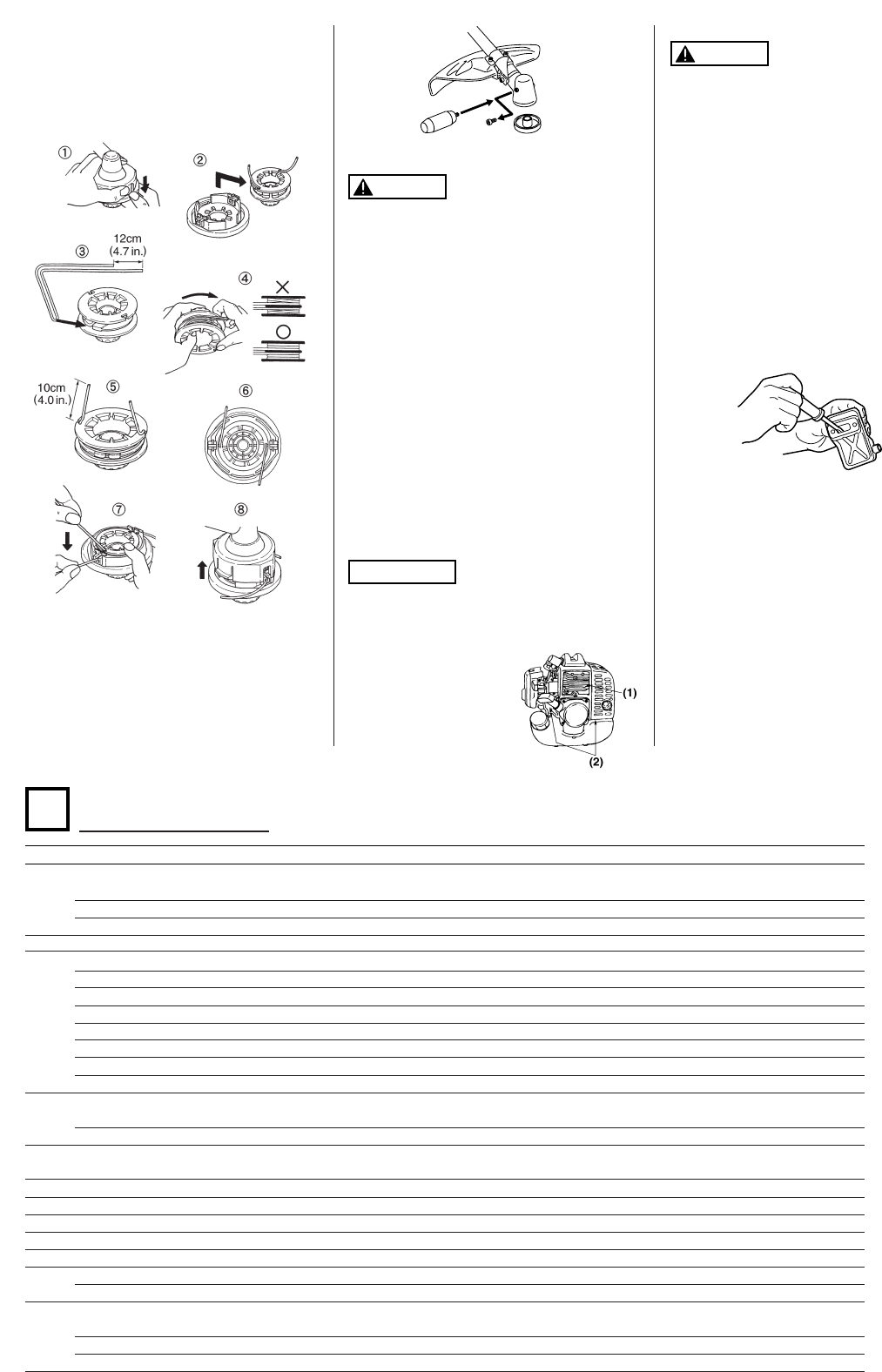
■ IMUFFLER
•Inspect periodically, the muffler for loose
fasteners, any damage or corrosion. If any
sign of exhaust leakage is found, stop using
the machine and have it repaired
immediately.
• Note that failing to do so may result in the
engine catching on fire.
■ PROCEDURES TO BE PERFORMED AFTER
EVERY 100 HOURS OF USE
1. Remove the muffler, insert a screwdriver into
the vent, and wipe away any carbon buildup.
Wipe away any carbon buildup on the muffler
exhaust vent and cylinder exhaust port at the
same time.
2. Tighten all screws, bolts, and fittings.
3. Check to see if any oil or grease has worked its
way in between the clutch lining and drum, and
if it has, wipe it away using oil-free, lead-free
gasoline.
■ MAINTENANCE BEFORE STORAGE
•Old fuel left in the carburetor may cause
starting failure. When a series of operation
finished, make sure to empty the fuel tank and
drain the carburetor.
• Check all parts and the functions. If the failured
or damaged parts have been found, replace
them with new ones.
WARNING
through the eyelets on the housing. Make sure
that the spring and the washers are in place.
6. While holding the spool against the housing,
pull the line ends to release them from the slot.
7. Line up the slot on the bottom cap with the hook
on the housing, press the cap against the
housing until it clicks.
■ GEAR CASE
• The reduction gears are lubricated by
multipurpose, lithium-based grease in the gear
case. Supply new grease every 25 hours of use
or more often depending on the job condition.
• Remove the bolt opposit to the grease nipple
before installing new grease to arrange for old
grease to exit.
Specifications
7
MODEL CODE Unit BC2311LE BC2611LE BC2611WE BC3501LE BC3501WE BC4501WE
Overall size
Length mm 1815 ←←1845 ←←
Width mm 420 ← 650 420 650 ←
Height mm 295 ← 560 360 560 ←
Dry weight Kg 5.0 5.1 5.3 7.1 7.6 7.8
Engine model ✽ G23LS G26LS ← G35L-D ← G45L-D
Displacement cc 22.5 25.4 ← 33.6 ← 41.5
Carburetor ✽ Diaphragm ←←←←←
Fuel (Mixture ratio) ✽
50:1 (Gasoline and 2cycle oil)
←←←←←
Fuel tank capacity litter 0.6 0.75 ← 0.74 ← 0.94
Service range rpm 5000~8000 ←←←←←
Spark plug ✽ BPMR7A ←←←←←
Clutch system ✽
Two-shoe Centrifugal-Type
←←←←←
Anti-vibration system
Housing ✽ Yes ←←←←←
Handle-bracket ✽ No ←←←Yes ←
Gearhead
Neck angle deg 60 ←←←←←
Reduction ratio ✽ 1.462 ←←1.40 ←←
Blade rotation ✽ Counter-clockwise ←←←←←
Handle type ✽ Loop ← Both Loop Both ←
Throttle lever ✽
Trigger Type (With Safety-lock)
←←←←←
Standard cutter ✽ Nylon ←←←←←
Harness type ✽ Single ←←Double ←←
Quick release ✽ Yes ←←←←←
Standard accessories
Goggle ✽●←←←←←
Tool-kit ✽●←←←←←
Owner's manual ✽●←←←←←
Specifications are subject to change without notice.
■ INTAKE AIR COOLING VENT
• Never touch the cylinder, muffler, or spark
plugs with your bare hands immediately
after stopping the engine. The engine can
become very hot when in operation, and
doing so could result in severe burns.
• When checking the machine to make sure
that it is okay before using it, check the area
around the muffler and remove any wood
chips or leaves which have attached
themselves to the brushcutter. Failing to do
so could cause the muffler to become
overheated and that in turn could cause the
engine to catch on fire. Always make sure
that the muffler is clean and free of wood
chips, leaves, and other waste before use.
• Check the intake air cooling vent and the
area around the cylinder cooling fins after
every 25 hours of use for blockage, and
remove any waste which has attached itself
to the brushcutter. Note that it is necessary
to remove the engine cover shown in in
order to be able to view the upper part of the
cylinder.
If waste gets stuck and causes blockage around
the intake air cooling vent or between the cylinder
fins, it may cause the engine to overheat, and that
in turn may cause mechanical failure on the part of
the brushcutter.
(1) Cylinder
(2) Intake air cooling vent
IMPORTANT
WARNING






